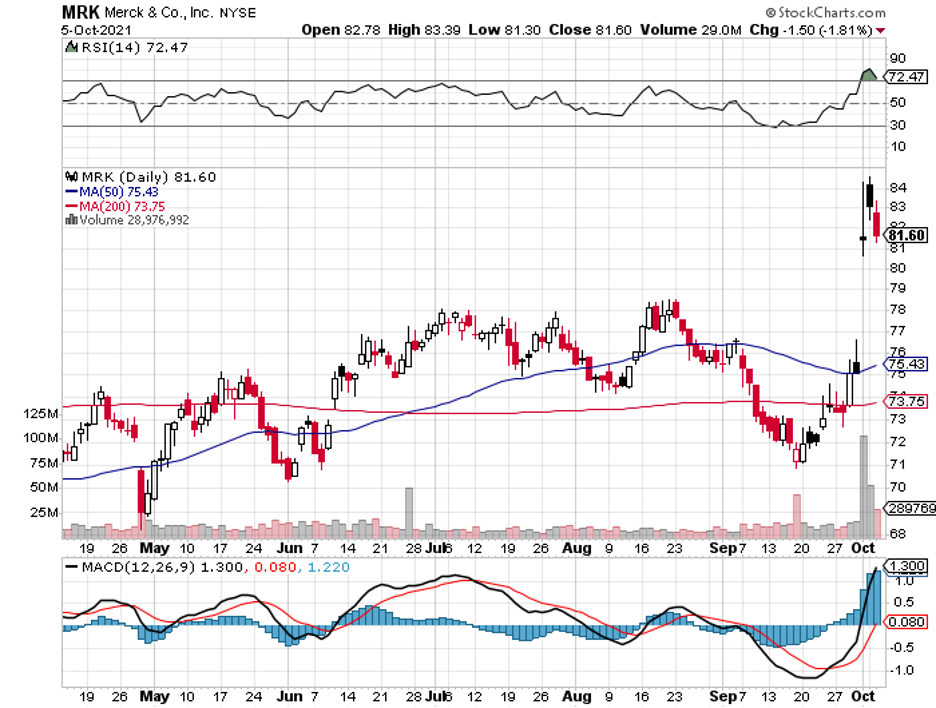A Rare Blue-Chip Stock in Deep Value Territory
Merck (MRK) is facing a huge problem. In roughly seven years, its top-selling megablockbuster cancer treatment Keytruda is set to lose its patent exclusivity.
This is a major concern for the company, considering that Keytruda comprised over a third of the their revenue in 2020.
This impending “doom” appears to have scared off investors, as Merck stock has been trading at at least 12 times the earnings expected within the next 12 months.
However, it looks like Merck is slowly gearing up to reveal the solutions it came up with to address this major problem.
The first sign of a turnaround is Merck’s recent news about releasing an oral antiviral pill for COVID-19.
Immediately after the release of the positive data, the biopharmaceutical giant’s $206 billion market capitalization climbed by $16 billion, showing off an 8.4% in its share price.
In comparison, other COVID-19 vaccine stocks experienced significant selloffs. Novavax (NVAX) fell by 12%, while Moderna (MRNA) slipped by 11%.
Merck’s COVID-19 pill, called Molnupiravir, is expected to be a cheaper, safer, and more effective alternative to the current antiviral treatment available today, which is Remdesivir from Gilead Sciences (GILD).
Molnupiravir has been so promising that the US government already sealed a $1.2 billion contract with Merck to get 1.7 million doses of the drug months before the announcement.
While there’s still no final word on the pricing, the US government’s deal places the drug at $700 per dose.
Given its manufacturing capacity, Merck disclosed that it could easily produce six times that order, with the company targeting roughly 10 million courses by the end of 2021.
Using these numbers, it’s easy to see how Merck can generate $7 billion in sales of Molnupiravir alone this fourth quarter.
Although Molnupiravir’s sales won’t be a game-changer for Merck in the same way Moderna’s COVID-19 vaccine candidate changed its landscape, the $7 billion revenue would still offer a significant boost.
Another 10 million doses of Molnupiravir are slated for release by 2022, indicating higher sales for Merck in the coming months.
Aside from working as an antiviral pill, Molnupiravir is also believed to be effective against other known viruses like influenza.
Considering the surging demand for travel these days, there’s a huge possibility that Merck’s oral drug will be handed out like candy canes as a potential preventive measure.
After all, the efficacy of the COVID-19 vaccines, especially for those who got jabbed earlier than most, would start to wane at this point.
Taking into account the demand for this pill worldwide, it’s realistic to assume that Molnupiravir can generate $35 billion to $70 billion in revenue for Merck.
Even before the news about Molnupiravir broke, Merck already raised its revenue guidance for 2021 to somewhere between $46.4 billion to $47.4 billion, signaling 12% to 14% growth.
Aside from its COVID-19 drug, Merck has been busy expanding its portfolio that already covers oncology, hepatitis, and HPV.
One of its latest moves to achieve this goal is its $10.8 billion acquisition of Acceleron Pharma (XLRN)—a deal Merck snagged right under the nose of the strongest contender in the race, Bristol-Myers Squibb (BMY).
Merck’s acquisition of Acceleron will boost the cardiovascular pipeline of the company, including treatments for life-threatening blood vessel conditions.
These are on top of its growing vaccine business, which still has four queued for Phase 2 clinical trials and another for regulatory review.
These candidates effectively make Merck a critical player in the rapidly expanding vaccine market—a segment that’s projected to rise from $42 billion in 2020 to $74 billion by 2028.
Overall, Merck is one of the unparalleled blue-chip stocks trading in deep-value territory these days.
It’s hitting all cylinders, showing off a stable expansion of its key franchises and an impressive balance sheet to fund its R&D plans.
Merck has become the poster child of a remarkable stock valued at a reasonable price.

